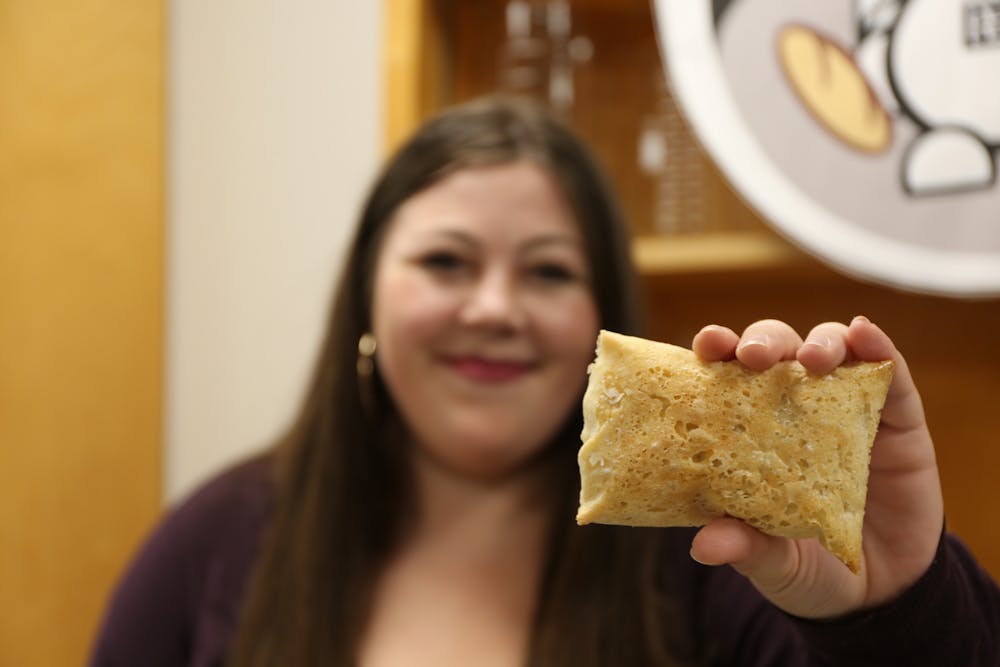Hope Hersh’s space bread is one small step for baking, one giant leap for extraterrestrial dining.
The UF doctoral student led one of 18 U.S. teams selected as winners in the Deep Space Food Challenge to each receive a $25,000 prize.
All 18 teams are invited to participate in the second phase of the challenge, which will feature a kitchen demonstration for NASA. No date is currently set.
The challenge, hosted by NASA and the Canadian Space Agency, sought tasty solutions to preserve nutrients in food for years-long journeys to Mars and beyond. Hersh, a 27-year-old UF plant molecular and cellular biology doctoral student, worked on the project with advice from her doctoral adviser, professor Mark Settles.
“Dr. Settles was getting his blood drawn one day and had this brilliant idea,” Hersh said. “He was looking at the blood bags and was like, ‘Hmm I wonder if we can grow living organisms in those.’”
The bags, also known as Fluorinated Ethylene Propylene bags, or FEP bags, are multifunctional, tolerate extreme high and low temperatures and allow gas to flow between the plastic membrane, which preserves the cells inside. For space bread, this meant a process of making and baking bread with minimal tools and an environment where yeast could rise.
From there, the two developed a way to grow algae in the bags and in Fall 2020, they discussed the idea of baking bread in a similar way.
“We can store and combine ingredients, allow the dough to rise within the plastic bag, and then throw the whole bag in the oven and bake the bread,” Hersh said. “Doing the most simplest things here on Earth is much more complicated when you’re in space, and we had to take all of that into consideration.”
Hersh declined to answer questions regarding the project funding.
Settles, who taught horticultural studies for almost 20 years, left UF earlier this year to become a civil servant at NASA’s research center. Hersh continued the project and applied for the Deep Space Food Challenge in January independently while leading a team of undergraduate students.
Though Settles has no monetary stake in whether the technology is adapted and was not a formal member of Hersh’s team, he said he had an academic interest in seeing how her project would develop. They share an interest in space and learning how to improve the nutritional value of extraterrestrial food.
“I think Hope’s concept is the one that’s closest to actual implementation if it were to be followed up with the food systems group,” Settles said. “Many of the other ones have much more complicated, futuristic-looking solutions.”
Settles, in part, credits the pandemic baking phenomenon, a trend which saw the rise of easy and accessible recipes posted online. Hersh and Settles were inspired by the New York Times’ “no-knead bread” and converted the recipe into laboratory measurements for the project.
Hersh needed to address factors like baking time, temperatures, ingredients and equipment available at the space station.
Hersh plans to re-invest the prize money into the project to continue solving challenges like finding the best supplier of the bags.
“We were both in shock at the time because $25,000 is a lot of money,” Hersh said. “I just want to contribute to science. I want to contribute to adventuring in space and discovering new things.”
Contact Maia at mbotek@alligator.org Follow her on Twitter @BotekMaia
Maia Botek is a third-year journalism major and Spanish minor covering student government this semester. Maia is from South Florida and enjoys the beach, spending time with her friends and learning about the environment in her free time.






